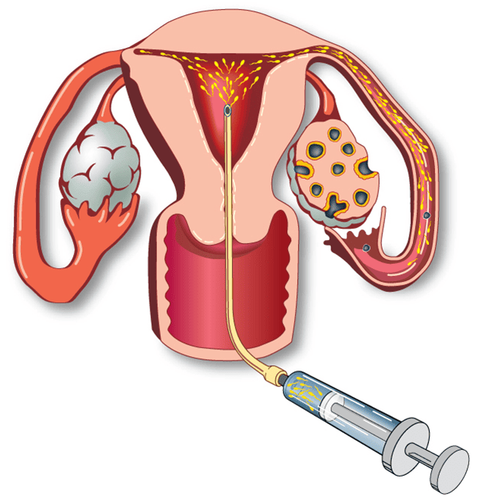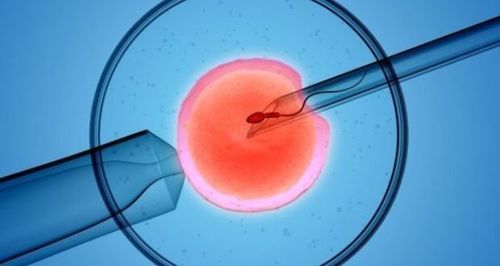This is an automatically translated article.
The article is professionally consulted by Master, Doctor Nguyen Van Thanh - Obstetrician and Gynecologist - Department of Obstetrics and Gynecology - Vinmec Ha Long International HospitalInfertility is a fairly common condition today with the rate of couples suffering from it is increasing. Equipping yourself and your family with the knowledge and methods of infertility treatment is extremely helpful.
1. What is infertility?
Infertility is defined as the failure to become pregnant after one year of regular sex without using contraception. If the patient is older than 35 years and has not become pregnant after 6 months of unprotected intercourse, an evaluation for infertility should be performed. If the patient is over 40 years of age and has not become pregnant within 6 months of unprotected intercourse, an infertility assessment should be performed before the 6-month mark is reached.2. What causes infertility?
The most common cause of female infertility is either not ovulating or ovulating irregularly. The most common cause of male infertility is testicular problems that affect how sperm is made or how it works.Age is a major factor in infertility. For healthy couples in their 20s or early 30s, the chance of a woman getting pregnant is about 25-30% during any given menstrual cycle. By age 40, a woman's chance of getting pregnant drops to less than 10% with each menstrual cycle. A man's fertility also declines with age, but there is no fixed predicted level.
Lifestyle-related factors can also play a role in infertility. In women, being underweight, overweight, or exercising too much can be linked to infertility. In both men and women, moderate alcohol consumption or addiction can be a factor in infertility.

3. Infertility and infertility treatments
Treatment options will depend on the cause of your infertility. Lifestyle changes, medications, surgery, or other methods may be recommended. Several treatments can be combined to improve results. Infertility can be successfully treated even if no cause is found.4. Can lifestyle changes improve your chances of getting pregnant?
Maintaining a healthy weight and eating a healthy diet can be very helpful for both men and women with infertility. If your spouse smokes, uses drugs, or drinks alcohol, stop.5. How is surgery used to treat infertility in women?
In women, surgery can help repair blocked or damaged fallopian tubes. Surgery may also be used to treat infertility-related endometriosis. Women with polyps or fibroids in the uterus may also have surgery.6. How is surgery used to treat male infertility?
A common problem that leads to male infertility is varicose veins in the scrotum. This condition can be treated with surgery.7. How to treat hormone related problems in women?
Abnormal hormone levels can cause irregular or no ovulation. A health professional may check the levels of certain hormones. If a hormone problem is found, treatment will be given to correct it. This treatment improves a woman's chances of getting pregnant.8. What is ovulation stimulation?
Ovulation stimulation is the use of medication to help a woman's ovaries release an egg. This treatment is used when a woman ovulates irregularly or at all when other causes have been ruled out. Ovulation stimulation can be used in combination with other infertility treatments.9. How is ovulation stimulation performed?
Oral medications used to induce ovulation include: Clomiphene Citrate, aromatase inhibitors, and insulin-lowering drugs. While taking these drugs, women will be monitored to monitor when ovulation occurs. This can be done by tracking your menstrual cycle or using an ovulation predictor (home urine test). Women may be asked to visit their doctor for a blood test or an ultrasound to confirm ovulation.10. What is Gonadotropin?
If Clomiphene Citrate or other medications are unsuccessful, gonadotropins may be used to induce ovulation. Gonadotropins are also used when large numbers of eggs are needed to treat infertility.11. How is gonadotropin used?
Gonadotropins are given through injections early in the menstrual cycle. Blood tests and ultrasound examinations are used to monitor the growth of the follicles. When the test results show that the follicles have reached a certain size, another drug may be given to stimulate the follicle to release a mature egg.12. What are the risks involved in inducing ovulation?
Twins occur in 5 to 8% of women treated with Clomiphene Citrate and aromatase inhibitors. Triplets or multiple births are more rare. The risk of multiple pregnancy is higher when gonadotropins are used. Up to 30% of multiple pregnancies occur with gonadotropins. If too many eggs develop, a health professional can intervene to delay the cycle to reduce the possibility of having a multiple pregnancy. Ovulation stimulation, especially with gonadotropins, can lead to ovarian hyperstimulation syndrome. Women experiencing ovulation should be monitored for this condition.Another risk of using gonadotropins is ectopic pregnancy. This is a pregnancy that begins to develop somewhere other than the uterus, usually in one of the fallopian tubes. An ectopic pregnancy requires medication or surgery.
13. What is intrauterine insemination?

14. What are the risks associated with IUI?
If ovulation-stimulating drugs are used in conjunction with IUI, multiple pregnancy may occur. If too many eggs are developing at the time of fertilization, fertilization may be delayed.15. What is assisted reproductive technology?
Assisted reproductive technology includes all fertility treatments that affect both the egg and sperm. Assisted reproductive technology often involves in vitro fertilization (IVF). With IVF, sperm is combined with an egg in a laboratory and then the embryo is transferred to the uterus. IVF is performed for the following causes of infertility:Fallopian tube damage or blockage that cannot be treated with surgery Certain factors of male infertility Severe endometriosis Premature ovarian failure Infertility of unknown cause core
16. How is IVF performed?
IVF is done in cycles. It may take more than one cycle to succeed. The first step in IVF is ovulation. Ovulation is usually stimulated with gonadotropins to produce multiple eggs. Eggs can also be obtained from a donor source. Previously frozen eggs can be used.When the egg is ready, a procedure is performed to remove the mature egg from the ovary. Egg fertilization with sperm can be done in the laboratory in two ways: (1) sperm can be added to the egg, (2) one sperm can be injected into each egg.
Eggs are checked the next day to see if they have been fertilized. A few days later, one or more embryos are placed in the uterus. This step is called embryo transfer. Embryos can also come from a donor source. Healthy embryos that are not transferred into the uterus can be frozen and stored for later use.
17. What are the risks associated with IVF?

Some studies suggest that IVF may be associated with a slightly increased risk of the occurrence of birth defects. Other studies suggest that this increase may be related to the underlying cause of infertility or to the age of some infertile couples. If women are concerned about birth defects, women can have an ultrasound to look for possible problems with the pregnancy.
Infertility treatment takes time and can be expensive. Consent between husband and wife is required. Infertility is one of the difficult problems that seriously affect the happiness of families. Vinmec Reproductive Support Center at Vinmec Times City International Hospital is the leading modern center in Vietnam, built and applied a comprehensive medical examination and treatment process, combining both Orthopedics and Obstetrics and Gynecology. gynecology to give the optimal plan for each patient case.
Please dial HOTLINE for more information or register for an appointment HERE. Download MyVinmec app to make appointments faster and to manage your bookings easily.
Articles refer to the source Acog.org













